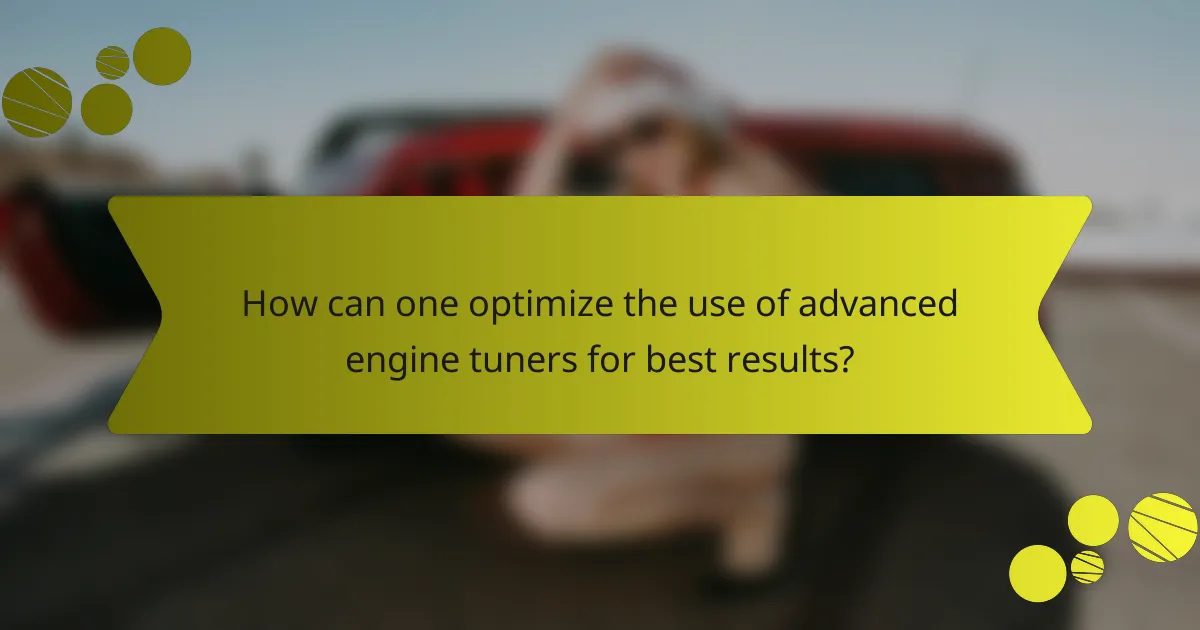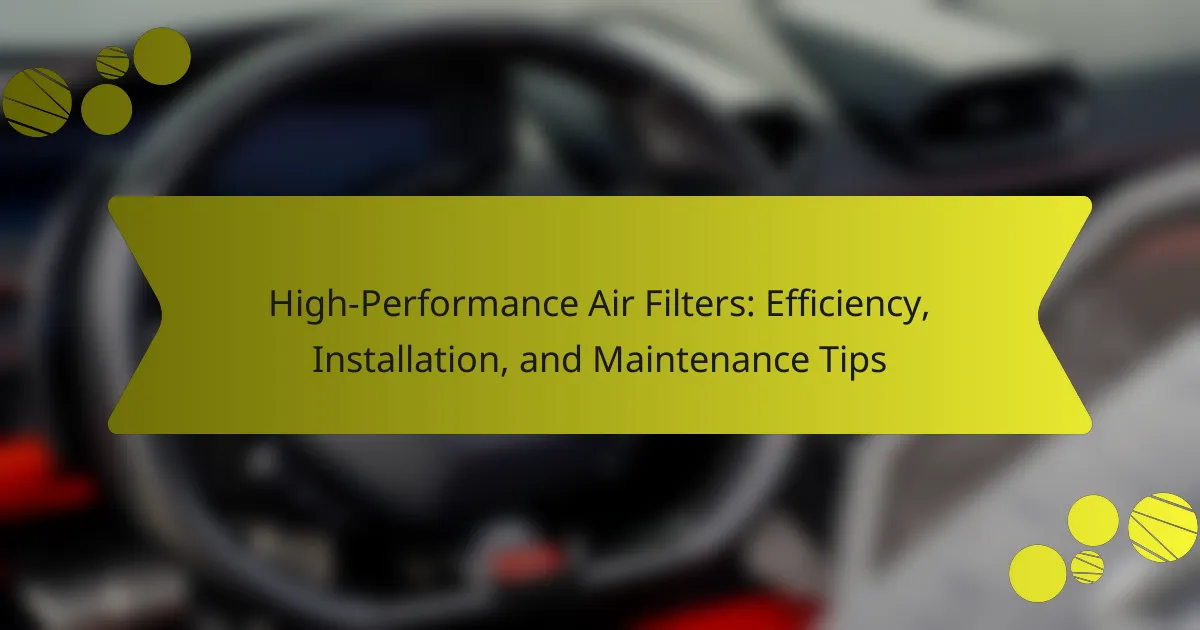Advanced engine tuners significantly boost vehicle performance by increasing horsepower and improving fuel efficiency. This article explores the benefits of these tuners, their compatibility with various vehicle makes like Ford and Chevrolet, and user reviews highlighting performance enhancements. Understanding installation and tuning parameters is essential for maximizing the advantages of advanced engine tuners.

What are the key benefits of advanced engine tuners?
Advanced engine tuners enhance vehicle performance through increased horsepower, improved fuel efficiency, and better throttle response. They also enable customization for specific driving needs. Compatibility varies by vehicle make and model, ensuring tailored enhancements. User reviews often highlight significant performance gains and overall satisfaction.
How do advanced engine tuners improve vehicle performance?
Advanced engine tuners enhance vehicle performance by optimizing fuel efficiency, increasing horsepower, and improving throttle response. They achieve this through software modifications and hardware upgrades.
These tuners adjust engine parameters such as air-fuel ratios, ignition timing, and boost levels, resulting in significant performance gains. For instance, a tuner may increase horsepower by up to 20% while maintaining fuel economy.
Compatibility varies; most tuners work with popular brands and models, but specific compatibility checks are essential. User reviews often highlight noticeable acceleration improvements and a more engaging driving experience.
Overall, advanced engine tuners represent a valuable investment for performance enthusiasts seeking to maximize their vehicle’s potential.
What fuel efficiency gains can be expected from using advanced engine tuners?
Using advanced engine tuners can improve fuel efficiency by 5% to 20%, depending on the vehicle and tuner type. These tuners optimize engine performance by adjusting fuel-air mixtures and ignition timing. Users report enhanced throttle response and smoother acceleration, contributing to overall efficiency gains. Additionally, some advanced tuners offer customizable settings, allowing users to tailor performance to specific driving conditions.
How do advanced engine tuners enhance engine longevity?
Advanced engine tuners enhance engine longevity by optimizing performance and reducing wear. They adjust fuel-air mixtures and ignition timing, leading to improved combustion efficiency. This results in lower operating temperatures and reduced stress on engine components. Additionally, advanced tuners often include features that monitor engine health, allowing for timely maintenance. Enhanced fuel efficiency is another benefit, leading to less frequent refueling and extended engine life.

Which vehicles are compatible with advanced engine tuners?
Many vehicles compatible with advanced engine tuners include popular brands like Ford, Chevrolet, Dodge, and Volkswagen. These tuners typically support models with aftermarket performance parts or factory tuning capabilities.
| Vehicle Brand | Compatible Models | Engine Types |
|—————|—————————|——————–|
| Ford | Mustang, F-150 | EcoBoost, V8 |
| Chevrolet | Camaro, Silverado | V6, V8 |
| Dodge | Charger, Challenger | HEMI V8 |
| Volkswagen | Golf GTI, Jetta | Turbocharged I4 |
| Subaru | WRX, STI | Turbocharged Boxer |
| BMW | 3 Series, M Series | Inline-4, Inline-6 |
Compatibility often depends on the specific tuner model and the vehicle’s modifications.
What factors determine compatibility with advanced engine tuners?
Compatibility with advanced engine tuners depends on vehicle make, model, engine type, and tuning goals. Each tuner may have unique requirements for optimal performance. Factors like engine management system compatibility and performance modifications also play crucial roles. Understanding these aspects ensures effective tuning and maximizes benefits.
How do compatibility issues vary between vehicle makes and models?
Compatibility issues between vehicle makes and models can significantly affect the performance of advanced engine tuners. Different manufacturers use unique engine architectures and electronic systems, which can lead to varying levels of compatibility. For example, a tuner designed for a Ford engine may not function properly on a Chevrolet model due to differences in engine management systems. Additionally, certain tuners may only support specific engine types or configurations, making it essential for users to verify compatibility with their vehicle’s make and model before purchase. User reviews often highlight these compatibility challenges, emphasizing the importance of researching specific tuners for individual vehicles.

What unique features do different advanced engine tuners offer?
Different advanced engine tuners offer unique features that enhance performance and customization. Notable features include real-time data logging, customizable tuning maps, and compatibility with various vehicle models. Some tuners provide advanced diagnostics and user-friendly interfaces, while others focus on specific performance enhancements like throttle response or fuel efficiency. Additionally, certain tuners allow for cloud-based updates, ensuring the latest tuning options are always available.
How do advanced engine tuners differ in their tuning capabilities?
Advanced engine tuners vary significantly in their capabilities, impacting performance and customization. Some tuners offer extensive mapping options, allowing for precise adjustments to fuel delivery and ignition timing. Others may focus on user-friendly interfaces, enabling novice users to enhance vehicle performance without deep technical knowledge. Compatibility with different engine types is another key differentiator, as some tuners support a wider range of vehicles. User reviews often highlight the effectiveness of specific tuners in achieving desired performance gains, showcasing their unique attributes.
What advanced tuning options are available for specific vehicle types?
Advanced engine tuners offer various tuning options tailored to specific vehicle types, enhancing performance and efficiency. Common options include ECU remapping, performance chips, and piggyback systems, each designed to cater to specific engine configurations.
| Vehicle Type | Tuning Option | Benefits | Compatibility | User Rating |
|———————|———————–|——————————–|————————-|————-|
| Gasoline Engines | ECU Remapping | Increased horsepower | Most modern vehicles | 4.5/5 |
| Diesel Engines | Performance Chips | Improved torque | Selected diesel models | 4.7/5 |
| Sports Cars | Piggyback Systems | Enhanced throttle response | Specific sports models | 4.8/5 |
| SUVs | Custom Tuning Kits | Better fuel efficiency | Various SUV brands | 4.6/5 |
| Electric Vehicles | Software Updates | Optimized battery performance | Specific EV models | 4.9/5 |
| Classic Cars | Carburetor Tuning | Improved engine responsiveness | Vintage models | 4.4/5 |

What are the common user experiences and reviews of advanced engine tuners?
Advanced engine tuners generally receive positive user experiences, highlighting enhanced performance and fuel efficiency. Users appreciate the customization options and ease of installation.
Common reviews note improved throttle response and horsepower gains, with many reporting noticeable differences after tuning. Compatibility with various vehicle models is often praised, though some users encounter issues with specific brands.
Overall, advanced engine tuners are well-regarded for their ability to maximize engine potential, making them a popular choice among automotive enthusiasts.
How do user reviews reflect the effectiveness of different brands?
User reviews are a critical indicator of the effectiveness of advanced engine tuners. They provide insights into performance improvements, compatibility with various vehicle models, and overall user satisfaction. Many users report enhanced horsepower and torque, which reflects the tuner’s effectiveness. Reviews often highlight specific brands that excel in certain attributes, such as ease of installation or customer support. For instance, some brands may receive praise for their user-friendly interfaces, while others are noted for their robust tuning options. Overall, user feedback helps potential buyers gauge which advanced engine tuners are most reliable and effective for their needs.
What challenges do users face when installing and using advanced engine tuners?
Users face several challenges when installing and using advanced engine tuners, including compatibility issues, complexity of installation, and potential warranty concerns. Compatibility with specific vehicle models can be a major hurdle, as not all tuners support every engine type. Installation often requires technical knowledge, which can deter less experienced users. Additionally, using tuners may void vehicle warranties, creating apprehension among users. These challenges can impact the overall user experience and satisfaction with advanced engine tuners.

How can one optimize the use of advanced engine tuners for best results?
To optimize the use of advanced engine tuners, focus on proper installation, tuning parameters, and regular updates. Ensure compatibility with your vehicle’s make and model for optimal performance.
1. Research the specific tuner model to understand its features and capabilities.
2. Follow the manufacturer’s installation instructions carefully to avoid issues.
3. Adjust tuning parameters based on driving style and performance goals.
4. Regularly update the tuner’s software to access improvements and new features.
5. Monitor performance metrics to evaluate the effectiveness of the tuning changes.
These steps enhance the benefits of advanced engine tuners, ensuring better engine performance and efficiency.
What best practices should users follow when tuning their engines?
To optimize engine tuning, users should follow best practices such as thorough research, using quality components, and monitoring performance. Start with a proper baseline to understand the current engine performance before making adjustments. Regularly check compatibility of tuning parts with the vehicle model to avoid issues. User reviews can provide insights into effective tuning strategies and potential pitfalls. Finally, maintain consistent documentation of changes to track improvements and troubleshoot effectively.
Which common mistakes should be avoided when using advanced engine tuners?
Common mistakes to avoid when using advanced engine tuners include improper installation, neglecting vehicle compatibility, and ignoring manufacturer guidelines. These errors can lead to performance issues or engine damage. Additionally, failing to monitor engine parameters after tuning can result in suboptimal performance. Always conduct thorough research and ensure proper calibration for best results.



